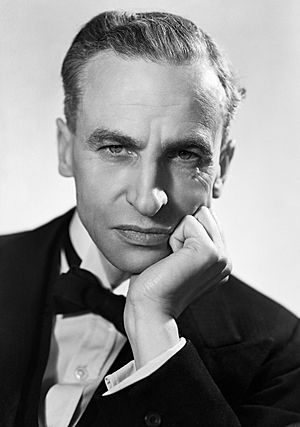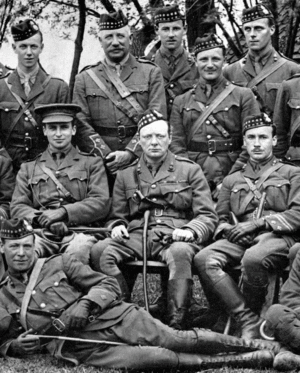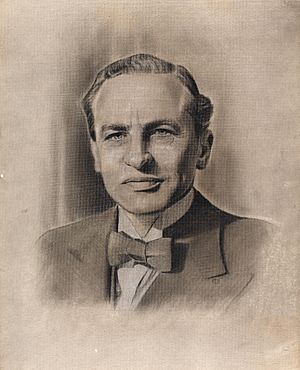Archibald Sinclair, 1st Viscount Thurso facts for kids
Quick facts for kids
The Viscount Thurso
|
|
|---|---|

Archibald Sinclair as Secretary of State for Air during the Second World War
|
|
| Leader of the Liberal Party | |
| In office 26 November 1935 – 26 July 1945 |
|
| Deputy | Percy Harris (1940–1945) |
| Preceded by | Herbert Samuel |
| Succeeded by | Clement Davies |
| Secretary of State for Air | |
| In office 11 May 1940 – 23 May 1945 |
|
| Monarch | George VI |
| Prime Minister | Winston Churchill |
| Preceded by | Sir Samuel Hoare, Bt |
| Succeeded by | Harold Macmillan |
| Deputy Leader of the Liberal Party | |
| In office 4 November 1931 – 26 November 1935 |
|
| Leader | Herbert Samuel |
| Preceded by | Herbert Samuel |
| Succeeded by | Percy Harris 1940–1945 |
| Secretary of State for Scotland | |
| In office 25 August 1931 – 28 September 1932 |
|
| Monarch | George V |
| Prime Minister | Ramsay MacDonald |
| Preceded by | William Adamson |
| Succeeded by | Sir Godfrey Collins |
| Liberal Chief Whip | |
| In office 1930 – 25 August 1931 |
|
| Leader | David Lloyd George |
| Preceded by | Robert Hutchison |
| Succeeded by | Goronwy Owen |
| Member of the House of Lords Lord Temporal |
|
| In office 7 July 1954 – 15 June 1970 Hereditary Peerage |
|
| Preceded by | Peerage created |
| Succeeded by | The 2nd Viscount Thurso |
| Member of Parliament for Caithness and Sutherland |
|
| In office 15 November 1922 – 5 July 1945 |
|
| Preceded by | Leicester Harmsworth |
| Succeeded by | Eric Gandar Dower |
| Personal details | |
| Born |
Archibald Henry Macdonald Sinclair
22 October 1890 Chelsea, London, England or Caithness, Scotland |
| Died | 15 June 1970 (aged 79) Twickenham, London, England |
| Political party | Liberal |
| Spouses |
Marigold Forbes
(m. 1918) |
| Alma mater | Royal Military College, Sandhurst |
| Signature | |
Archibald Henry Macdonald Sinclair, 1st Viscount Thurso (born October 22, 1890 – died June 15, 1970) was an important British politician. He was the leader of the Liberal Party for many years. People often called him "Archie Sinclair." He was known as Sir Archibald Sinclair before 1952.
Contents
Early Life and Education
Archibald Sinclair was born in 1890 in Caithness, Scotland. His mother died soon after he was born, and his father passed away in 1895. He was raised by different family members.
He went to Eton College, a famous school, and then to the Royal Military College, Sandhurst. In 1910, he joined the Life Guards, a special part of the British Army. In 1912, he became the fourth Baronet of Ulbster, which meant he inherited a special title and a lot of land in Caithness. He enjoyed playing polo and flying airplanes. During this time, he became good friends with Winston Churchill.
Military Service

Sinclair fought in the First World War on the Western Front. In 1915, he worked as an aide de camp (a personal assistant) to J. E. B. Seely. He eventually became a Major in the Guards Machine Gun Regiment.
After Winston Churchill left his role as First Lord of the Admiralty, Sinclair became his second-in-command. This was in 1916, when Churchill took charge of the 6th Battalion of the Royal Scots Fusiliers. They were stationed in the Ploegsteert Wood area.
Working with Winston Churchill
From 1919 to 1921, Sinclair worked closely with Winston Churchill. He was Churchill's Personal Military Secretary when Churchill was the Secretary of State for War. Later, he joined Churchill at the Colonial Office as his Private Secretary.
Sinclair helped Churchill with important information and communications. He also helped manage sensitive situations involving international figures.
Political Career (1922–1939)
In 1922, Sinclair became a Member of Parliament (MP) for Caithness and Sutherland. He was a member of the Liberal Party. He quickly moved up in the party and became the Chief Whip by 1930. The Chief Whip's job is to make sure party members vote in line with the party's decisions.
In 1931, the Liberal Party joined the National Government led by Ramsay MacDonald. Sinclair was appointed Secretary of State for Scotland. This meant he was in charge of many government matters in Scotland. He was also made a member of the Privy Council, a group of important advisors to the monarch. In 1932, he and other Liberal ministers left the government. They disagreed with new trade agreements that favored countries within the British Empire.
In the 1935 election, the Liberal Party leader lost his seat. Sinclair then became the new leader of the Liberal Party, with 20 MPs. During the Abdication Crisis of 1936, when King Edward VIII decided to give up his throne, Sinclair was considered as a possible leader for a new government. However, he and other political leaders decided not to form a government under those circumstances.
Sinclair was strongly against the dictatorships in Europe before World War II. He supported the League of Nations, an organization that aimed to promote peace. He believed countries should work together for safety. He joined groups that were against the Nazi regime. Some people disagreed with his strong views on foreign policy, thinking he was too eager for conflict.
During the Munich Crisis in September 1938, Sinclair was part of a group that disagreed with Prime Minister Neville Chamberlain's approach to Nazi Germany. He criticized Chamberlain for giving in to Germany's demands.
Second World War
When Winston Churchill formed a special government during World War II in 1940, Sinclair became the Secretary of State for Air. This meant he was in charge of the Royal Air Force (RAF). During a major crisis in May 1940, after France fell to Germany, Sinclair supported Churchill's decision to keep fighting. He was against the idea of making a peace deal with Nazi Germany.
One of Sinclair's first big jobs was to help the RAF plan for the Battle of Britain. This was a crucial air battle against the German air force. Later in the war, he disagreed with Churchill about the strategy of bombing German cities. However, in 1942, he convinced Churchill not to take revenge on German villages for war crimes, like the Lidice massacre.
Sinclair remained a minister until May 1945, when the war government ended. In the 1945 election, he lost his seat in Parliament by a very small number of votes.
Later Years
In the 1950 election, Sinclair tried to win back his old seat but came in second. In 1952, he had his first stroke. That year, he was given the title of Viscount Thurso of Ulbster, which meant he became a member of the House of Lords. He had another, more serious stroke in 1959, which affected his health greatly. He passed away at his home in Twickenham in 1970.
Family
In 1918, Archibald Sinclair married Marigold Forbes. They had four children:
- Catherine (1919–2007)
- Elizabeth (1921–1994)
- Robin (1922–1995), who later became the 2nd Viscount Thurso.
- Angus John (1925-2003)
Legacy
The Southern Railway named a steam locomotive after him, called "Sir Archibald Sinclair." This train was part of the "Battle of Britain Class." Sir Archibald himself officially named the locomotive at Waterloo station on February 24, 1948.
See Also
- List of Liberal Party (UK) leaders
Images for kids


